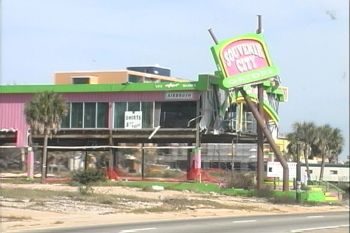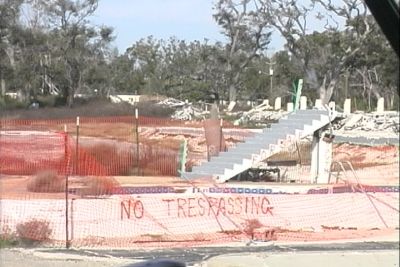
Publisher:
Bonnie King
CONTACT:
Newsroom@Salem-news.com
Advertising:
Adsales@Salem-news.com

~Truth~
~Justice~
~Peace~
TJP
Sep-06-2010 07:47


 TweetFollow @OregonNews
TweetFollow @OregonNews
Hurricane Katrina Survival:
The Fred Holley Story *Documentary
Tim King Salem-News.com
The process to restore all that nature swept away has been painfully slow.
 Photos and video by Tim King Salem-News.com |
(GULFPORT, Miss.) - There was a night when Hurricane Katrina Survivor Fred Holley, a Vietnam Veteran, wondered if he would ever feed the seagulls along the Gulf Coast again.

I met this man one year after the tragic event, while enroute to cover the war in Afghanistan. He toured me through the devastation of his homeland. The calm blue skies Fred enjoyed in late 2006 shine over a place still in need of a great deal of repair.
Fred Holley said he had not traveled much in the year following the hurricane.
"As a matter of fact I haven't been back to Biloxi since that day, since I've been hanging around here.
"Here" was a site only a quarter of a mile or so from the coastline, not far enough to have been out of the way of this monstrous event.
I asked this survivor, "What went through your mind the first time you saw it?"
Holley said, "It has a long way to go, a long way to go, that's the only thing you could say. It was more than fortunate that we didn't have that many deaths, but the property loss was enormous."
It was shocking to see the damage left behind by Hurricane Katrina. The tragedy affected a large area on the Gulf Coast and while New Orleans dominated the media attention, people in Mississippi suffered with far less public awareness.
Buildings here were wiped out, smashed, flooded with water; blasted by the raw fury of this now infamous hurricane that caused the world to focus attention on the vulnerability of the United States of America and its apparent inability to properly respond to people in need.
Fred Holley said it was almost like a tunnel driving on one side of the road; due to rows of big oak trees that all came down during Katrina.
"See all those empty slabs? Those were all homes and such," he said.
Driving through Gulfport, headed toward Biloxi, Fred wheeled his motor home into a beach parking lot where many buildings once stood. Items from people's homes were strewn along the sand, things that normally wouldn't be there. But the seagulls and the pleasant November air combined to give the place a false sense of tranquility, perhaps hinting at what existed here before the disaster.
Fred said before the storm, you could stand on the shoreline and watch fish jump, "You would see schools, I don't know if they have come back yet or not, but all that was good before the storm. No doubting how severe this disaster was here. The hurricane dealt a blow to this area that still lingers, five years later.
Fred Holley described the areas we visited, like a beach parking lot with nothing but concrete.
"Yeah all this was wood buildings, showers, a gift shop, all that stuff, Holley said.
"You have a lot of destruction, but wait until you get down to Biloxi where its just, place after place, and then we'll go into the city. I used to stay here, probably about a quarter of a mile back, not even that maybe, right up in there when the hurricane hit."
The Gulf Coast cities in Mississippi didn't just suffer physical loss; they lost historical landmarks, recreation areas, and the process to restore all that nature swept away has been painfully slow.
Background
Hurricane Katrina roared into Gulfport, Mississippi on August 29, 2005. This region was smashed by the strong eastern side of Hurricane Katrina. Many parts of Gulfport were flooded or destroyed in a single day by the strong hurricane-force winds. The fury of Katrina lasted over 16 hours. Wikipedia states that a storm surge exceeding 28 feet was measured in some sections. The fact that Fred Holley and so many others survived is amazing. The hurricane damaged over 40 Mississippi libraries, and thousands of other buildings.
Overall, at least 1,836 people died as a result of the hurricane itself and the subsequent floods. It was the single deadliest U.S. hurricane since the 1928 Okeechobee hurricane. Estimates of property damage were around $81 billion. That is three times the damage of Hurricane Andrew.
Hurricane Katrina formed over the Bahamas on August 23, 2005, crossing southern Florida as a moderate Category 1 hurricane. Deaths and some flooding were reported before the event gained strength, and began moving rapidly in the Gulf of Mexico.
The storm then weakened somewhat, before striking land again as a Category 3 storm Monday morning, August 29 in southeast Louisiana. It caused severe destruction along the Gulf coast from central Florida to Texas, much of it due to the storm surge.
Wikipedia states that the worst property damage took place in these coastal areas of Mississippi, where beachfront towns were flooded over 90% in hours, leaving boats and casino barges free to ram against buildings, pushing cars and houses inland, with waters reaching 6–12 miles inland in some areas.

And we now note that even five years later, thousands in Mississippi and Louisiana still live in temporary buildings and traliers. Residents have been faced with endless delays and all of the efficiency that often goes with government bureaucracy and paperwork. The poorest here suffered the worst. There was no equity in treatment. The help came from church groups and relief agencies and people who simply wanted to help by making a personal difference. One sacrifice here has only been met by another.
Fred Holley drove to his old neighborhood in Biloxi to show me exactly where he was when all hell broke loose in 2005.
Lots where homes once stood were just torn up.
An old friend of Fred's, Rodney Thompson, brought him up to date on who was left in the old neighborhood. There were not many people left.
Rodney Thompson says Habitats for Humanities and the Red Cross are relief agencies that have made a difference, but nobody had more people on the ground in late 2006 than faith based organizations.
Steve Miller, a reverend from North Carolina, represented one of many such groups there working when I visited Gulfport.
I have never forgotten the days I spent with Fred Holley in Mississippi and my discovery of the ruins of Gulfport and Biloxi on the Gulf Coast. Fred is the kind of American who doesn't hesitate to speak out for what is right, a survivor an educator, and a strong advocate of Veterans.
Tim King: Salem-News.com Editor and Writer
Tim King is a former U.S. Marine with twenty years of experience on the west coast as a television news producer, photojournalist, reporter and assignment editor. In addition to his role as a war correspondent, this Los Angeles native serves as Salem-News.com's Executive News Editor. Tim spent the winter of 2006/07 covering the war in Afghanistan, and he was in Iraq over the summer of 2008, reporting from the war while embedded with both the U.S. Army and the Marines.
Tim holds numerous awards for reporting, photography, writing and editing, including the Oregon AP Award for Spot News Photographer of the Year (2004), first place Electronic Media Award in Spot News, Las Vegas, (1998), Oregon AP Cooperation Award (1991); and several others including the 2005 Red Cross Good Neighborhood Award for reporting. Tim has several years of experience in network affiliate news TV stations, having worked as a reporter and photographer at NBC, ABC and FOX stations in Arizona, Nevada and Oregon. Serving the community in very real terms, Salem-News.com is the nation's only truly independent high traffic news Website. As News Editor, Tim among other things, is responsible for publishing the original content of 65 Salem-News.com writers. He reminds viewers that emails are easily missed and urges those trying to reach him, to please send a second email if the first goes unanswered. You can send Tim an email at this address: newsroom@salem-news.com
Articles for September 5, 2010 | Articles for September 6, 2010 | Articles for September 7, 2010



Quick Links
DINING
Willamette UniversityGoudy Commons Cafe
Dine on the Queen
Willamette Queen Sternwheeler
MUST SEE SALEM
Oregon Capitol ToursCapitol History Gateway
Willamette River Ride
Willamette Queen Sternwheeler
Historic Home Tours:
Deepwood Museum
The Bush House
Gaiety Hollow Garden
AUCTIONS - APPRAISALS
Auction Masters & AppraisalsCONSTRUCTION SERVICES
Roofing and ContractingSheridan, Ore.
ONLINE SHOPPING
Special Occasion DressesAdvertise with Salem-News
Contact:AdSales@Salem-News.com

Terms of Service | Privacy Policy

All comments and messages are approved by people and self promotional links or unacceptable comments are denied.
[Return to Top]
©2025 Salem-News.com. All opinions expressed in this article are those of the author and do not necessarily reflect those of Salem-News.com.